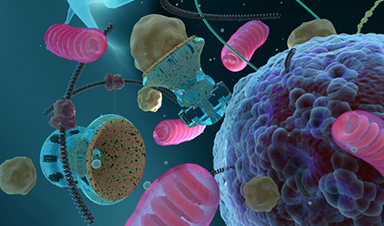Future nanomedical devices and systems will have strong potential to enable a broad range of aerospace and space applications. With further dimensional reductions in conjunction with the increased capabilities of nanoelectronics and artificial intelligence (AI), nanomedicine may facilitate the development of a wide array of advanced nanomedical diagnostic and therapeutic capabilities dedicated to the health and well being of future astronauts and space pioneers, the inhabitants of future Lunar and Mars colonies, and deep space explorers. These nanomedical innovations may form the core elements of advanced extravehicular space suits that have numerous advantages, such as continuous real-time health monitoring, virtually instantaneous in situ diagnostics, the auto-administration of therapeutics, and the capacities to address serious accidental circumstances and performance of emergency interventions.
Recent News
Fever-Proof Bird Flu Variant Could Fuel the Next Pandemic
Bird flu viruses present a significant risk to humans because they can continue replicating at temperatures higher than a typical fever. Fever is one of the body’s main tools [...]
What could the future of nanoscience look like?
Society has a lot to thank for nanoscience. From improved health monitoring to reducing the size of electronics, scientists’ ability to delve deeper and better understand chemistry at the [...]
New books from Frank Boehm, NA Founder – Released December 2025 by CRC Press
Molecular Manufacturing: The Future of Nanomedicine This book explores the revolutionary potential of atomically precise manufacturing technologies to transform global healthcare, as well as practically every other sector [...]
Scientists Melt Cancer’s Hidden “Power Hubs” and Stop Tumor Growth
Researchers discovered that in a rare kidney cancer, RNA builds droplet-like hubs that act as growth control centers inside tumor cells. By engineering a molecular switch to dissolve these hubs, they [...]
Platelet-inspired nanoparticles could improve treatment of inflammatory diseases
Scientists have developed platelet-inspired nanoparticles that deliver anti-inflammatory drugs directly to brain-computer interface implants, doubling their effectiveness. Scientists have found a way to improve the performance of brain-computer interface [...]
After 150 years, a new chapter in cancer therapy is finally beginning
For decades, researchers have been looking for ways to destroy cancer cells in a targeted manner without further weakening the body. But for many patients whose immune system is severely [...]
Older chemical libraries show promise for fighting resistant strains of COVID-19 virus
SARS‑CoV‑2, the virus that causes COVID-19, continues to mutate, with some newer strains becoming less responsive to current antiviral treatments like Paxlovid. Now, University of California San Diego scientists [...]
Lower doses of immunotherapy for skin cancer give better results, study suggests
According to a new study, lower doses of approved immunotherapy for malignant melanoma can give better results against tumors, while reducing side effects. This is reported by researchers at Karolinska Institutet [...]
Researchers highlight five pathways through which microplastics can harm the brain
Microplastics could be fueling neurodegenerative diseases like Alzheimer's and Parkinson's, with a new study highlighting five ways microplastics can trigger inflammation and damage in the brain. More than 57 [...]
Tiny Metal Nanodots Obliterate Cancer Cells While Largely Sparing Healthy Tissue
Scientists have developed tiny metal-oxide particles that push cancer cells past their stress limits while sparing healthy tissue. An international team led by RMIT University has developed tiny particles called nanodots, [...]
Gold Nanoclusters Could Supercharge Quantum Computers
Researchers found that gold “super atoms” can behave like the atoms in top-tier quantum systems—only far easier to scale. These tiny clusters can be customized at the molecular level, [...]
A single shot of HPV vaccine may be enough to fight cervical cancer, study finds
WASHINGTON -- A single HPV vaccination appears just as effective as two doses at preventing the viral infection that causes cervical cancer, researchers reported Wednesday. HPV, or human papillomavirus, [...]
About NanoApps Medical Inc

NanoApps Medical, Inc. was incorporated by Frank Boehm in 2009 with the goal of developing advanced nanomedical diagnostic and therapeutic technologies for the benefit of individuals across both the developing and developed worlds.
The larger picture will be to eventually attain a situation of “Global Health Care Equivalency” (GHCE) where any individual on the planet may have access to the same advanced, high quality, and cost effective nanomedical diagnostic and therapeutic technologies, no matter where they happen to reside, or under what conditions they live. Boehm is now compiling a book that will articulate this grand vision.
Further, NanoApps Medical is ambitiously aiming to transition terrestrial nanomedicine to space applications to facilitate future Lunar and Mars missions, such as those being boldly planned by NASA and SpaceX.










